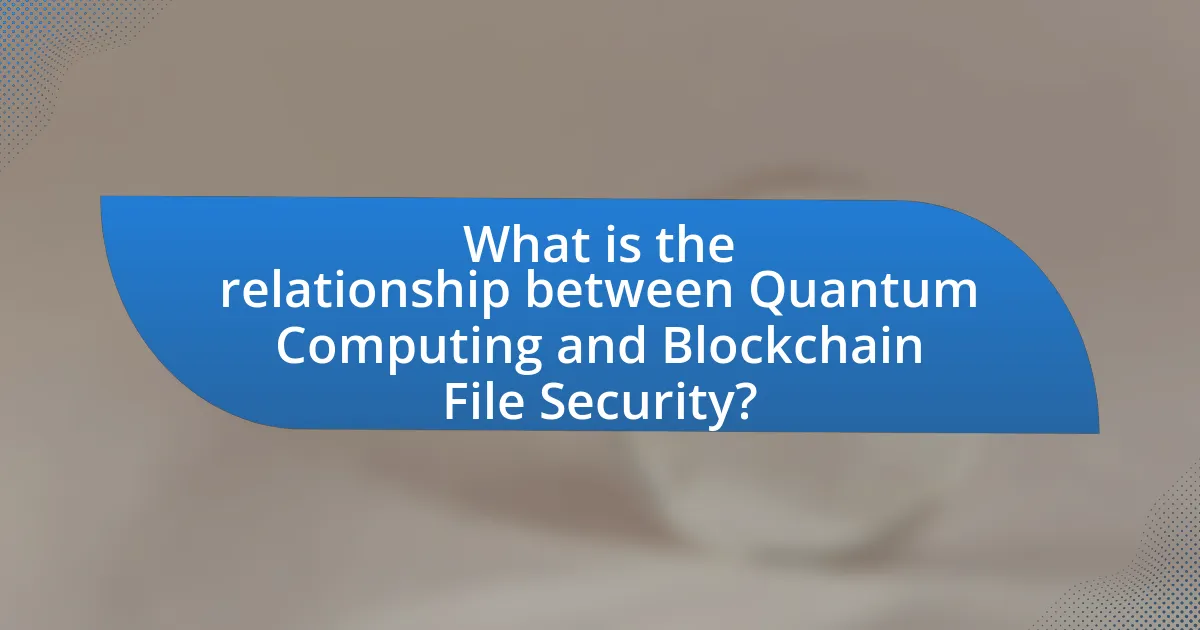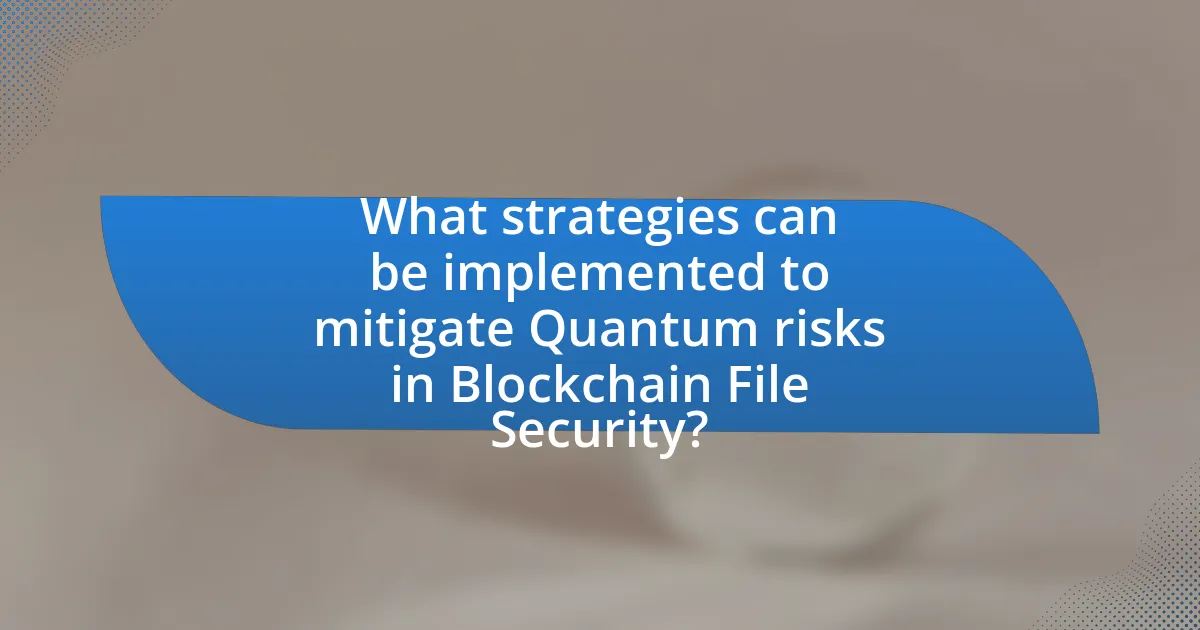Quantum computing presents a significant challenge to blockchain file security by threatening the integrity of traditional cryptographic algorithms that secure blockchain transactions. The article explores how quantum computers can efficiently break widely used encryption methods such as RSA and ECC, potentially compromising sensitive data and undermining trust in blockchain systems. It emphasizes the urgent need for the development of quantum-resistant cryptographic algorithms and discusses the implications for various sectors, including finance and healthcare. Additionally, the article outlines strategies for organizations to mitigate quantum risks and adapt blockchain technology to ensure robust security in the face of advancing quantum capabilities.

What is the relationship between Quantum Computing and Blockchain File Security?
Quantum computing poses a significant threat to blockchain file security due to its potential to break traditional cryptographic algorithms. Blockchain technology relies on cryptographic methods, such as SHA-256 and elliptic curve cryptography, to secure transactions and data. Quantum computers, leveraging principles of quantum mechanics, can perform calculations at speeds unattainable by classical computers, enabling them to solve these cryptographic problems efficiently. For instance, Shor’s algorithm allows quantum computers to factor large integers and compute discrete logarithms, which could compromise the security of blockchain networks. This relationship highlights the urgent need for the development of quantum-resistant cryptographic algorithms to safeguard blockchain file security against future quantum threats.
How does Quantum Computing challenge traditional encryption methods used in Blockchain?
Quantum computing poses a significant challenge to traditional encryption methods used in blockchain by leveraging its ability to solve complex mathematical problems much faster than classical computers. Specifically, quantum computers can efficiently execute algorithms, such as Shor’s algorithm, which can factor large integers and compute discrete logarithms, thereby compromising widely used encryption schemes like RSA and ECC that secure blockchain transactions. This vulnerability threatens the integrity and confidentiality of blockchain data, as quantum computers could potentially decrypt sensitive information and forge digital signatures, undermining trust in blockchain systems.
What are the specific encryption algorithms vulnerable to Quantum Computing?
Specific encryption algorithms vulnerable to Quantum Computing include RSA, DSA, and ECC (Elliptic Curve Cryptography). These algorithms rely on mathematical problems that quantum computers can solve efficiently using Shor’s algorithm, which can factor large integers and compute discrete logarithms in polynomial time. For instance, RSA’s security is based on the difficulty of factoring the product of two large prime numbers, a task that becomes feasible for quantum computers. Similarly, ECC’s security hinges on the difficulty of the elliptic curve discrete logarithm problem, which is also vulnerable to quantum attacks.
How does Quantum Computing’s processing power affect the security of Blockchain transactions?
Quantum Computing’s processing power poses a significant threat to the security of Blockchain transactions by enabling the rapid decryption of cryptographic algorithms currently used to secure these transactions. Traditional cryptographic methods, such as RSA and ECC, rely on the difficulty of factoring large numbers or solving discrete logarithm problems, which quantum computers can solve efficiently using algorithms like Shor’s algorithm. This capability means that a sufficiently powerful quantum computer could potentially break the encryption protecting Blockchain networks, allowing unauthorized access to sensitive data and the ability to manipulate transaction records. Research indicates that as quantum technology advances, the risk to Blockchain security increases, necessitating the development of quantum-resistant cryptographic solutions to safeguard against these vulnerabilities.
What role does Blockchain play in enhancing file security?
Blockchain enhances file security by providing a decentralized and immutable ledger for data storage. This technology ensures that once a file is recorded on the blockchain, it cannot be altered or deleted without consensus from the network, thereby preventing unauthorized modifications. Additionally, blockchain employs cryptographic techniques to secure data, making it resistant to hacking and fraud. For instance, a study by the World Economic Forum highlights that blockchain’s encryption methods significantly reduce the risk of data breaches, as each transaction is linked to a unique cryptographic hash. This combination of decentralization, immutability, and encryption establishes a robust framework for securing files against various threats.
How does Blockchain ensure data integrity and immutability?
Blockchain ensures data integrity and immutability through its decentralized and cryptographic structure. Each block in the blockchain contains a cryptographic hash of the previous block, creating a secure chain that links all blocks together. This linkage prevents any alteration of data without changing all subsequent blocks, which requires consensus from the network, making unauthorized changes nearly impossible. Additionally, the use of consensus mechanisms, such as Proof of Work or Proof of Stake, further reinforces the integrity of the data by requiring validation from multiple nodes before any transaction is recorded. This combination of cryptographic hashing and decentralized consensus ensures that once data is added to the blockchain, it remains unchanged and verifiable, thus maintaining its integrity and immutability.
What are the limitations of Blockchain in the context of Quantum threats?
Blockchain technology faces significant limitations in the context of quantum threats, primarily due to its reliance on cryptographic algorithms that quantum computers can potentially break. For instance, quantum computers can utilize Shor’s algorithm to efficiently factor large integers, undermining the security of widely used public-key cryptography such as RSA and ECC, which are foundational to blockchain security. This vulnerability means that transactions and data integrity could be compromised, as quantum computers could generate private keys from public keys, allowing unauthorized access to blockchain assets. Additionally, the current blockchain infrastructure lacks built-in mechanisms to upgrade cryptographic standards in response to evolving quantum threats, making it difficult to adapt and secure against these advanced computational capabilities.

What potential impacts does Quantum Computing have on Blockchain technology?
Quantum computing has the potential to significantly undermine the security of blockchain technology by breaking the cryptographic algorithms that secure transactions. Current blockchain systems rely on cryptographic methods such as SHA-256 and ECDSA, which are vulnerable to quantum attacks due to algorithms like Shor’s algorithm that can factor large numbers and compute discrete logarithms efficiently. For instance, a sufficiently powerful quantum computer could decrypt sensitive information and forge digital signatures, compromising the integrity of blockchain networks. This vulnerability necessitates the development of quantum-resistant cryptographic algorithms to safeguard blockchain technology against future quantum threats.
How might Quantum Computing influence the future of Blockchain security protocols?
Quantum computing may significantly undermine blockchain security protocols by enabling the rapid decryption of cryptographic algorithms currently used to secure transactions. Traditional blockchain security relies on cryptographic techniques such as SHA-256 and elliptic curve cryptography, which are designed to be computationally infeasible to break with classical computers. However, quantum computers utilize algorithms like Shor’s algorithm, which can factor large integers and compute discrete logarithms exponentially faster than classical algorithms, potentially compromising the integrity of blockchain systems. Research indicates that a sufficiently powerful quantum computer could break these cryptographic methods within a matter of hours, posing a serious threat to the security of blockchain networks.
What new security measures can be developed to counteract Quantum threats?
New security measures to counteract quantum threats include the implementation of post-quantum cryptography, which utilizes algorithms resistant to quantum computing attacks. For instance, the National Institute of Standards and Technology (NIST) is actively working on standardizing post-quantum cryptographic algorithms, with candidates like lattice-based, hash-based, and code-based cryptography showing promise. These algorithms are designed to secure data against potential decryption by quantum computers, which could break traditional encryption methods like RSA and ECC. The urgency for these measures is underscored by the fact that quantum computers are expected to achieve significant capabilities within the next decade, making it critical to transition to quantum-resistant systems to protect sensitive blockchain file security.
How can Blockchain adapt to integrate Quantum-resistant algorithms?
Blockchain can adapt to integrate quantum-resistant algorithms by implementing post-quantum cryptographic techniques that are designed to withstand quantum computing threats. These techniques include lattice-based, hash-based, and code-based cryptography, which have been identified as secure against quantum attacks. For instance, the National Institute of Standards and Technology (NIST) is actively working on standardizing post-quantum cryptographic algorithms, with several candidates already proposed, such as the lattice-based algorithm NTRU. By incorporating these algorithms into the blockchain protocol, developers can enhance the security of transactions and data storage against potential quantum threats, ensuring the integrity and confidentiality of blockchain systems in a future where quantum computing is prevalent.
What are the implications of Quantum Computing for Blockchain-based applications?
Quantum computing poses significant implications for blockchain-based applications, primarily due to its potential to break current cryptographic algorithms. Blockchain technology relies on cryptographic methods like SHA-256 and ECDSA for securing transactions and maintaining integrity. Quantum computers, leveraging algorithms such as Shor’s algorithm, can efficiently factor large numbers and compute discrete logarithms, which would undermine the security of these cryptographic systems.
Research indicates that a sufficiently powerful quantum computer could compromise the security of blockchain networks, allowing unauthorized access to private keys and enabling fraudulent transactions. For instance, a 2019 study by the National Institute of Standards and Technology highlighted the vulnerability of widely used cryptographic protocols to quantum attacks, emphasizing the urgency for blockchain developers to adopt quantum-resistant algorithms.
Which sectors are most at risk from Quantum Computing’s impact on Blockchain security?
The sectors most at risk from Quantum Computing’s impact on Blockchain security include finance, healthcare, and supply chain management. These sectors rely heavily on cryptographic techniques to secure sensitive data and transactions. For instance, the financial sector uses encryption to protect transactions and customer information, making it vulnerable to quantum attacks that can break traditional cryptographic algorithms. Similarly, the healthcare sector stores personal health information on blockchain systems, which could be compromised by quantum computing capabilities. In supply chain management, the integrity of data is crucial, and quantum computing could undermine the security of blockchain systems that track goods and transactions. The potential for quantum computers to solve complex mathematical problems much faster than classical computers poses a significant threat to the cryptographic foundations of these sectors.
How can businesses prepare for the convergence of Quantum Computing and Blockchain technology?
Businesses can prepare for the convergence of Quantum Computing and Blockchain technology by investing in quantum-resistant cryptographic algorithms. As quantum computers have the potential to break traditional cryptographic methods, adopting algorithms that are designed to withstand quantum attacks is essential for maintaining blockchain security. Research indicates that the National Institute of Standards and Technology (NIST) is actively working on standardizing post-quantum cryptography, which highlights the urgency for businesses to stay informed and implement these advancements. Additionally, businesses should engage in continuous education and training for their technical teams to understand the implications of quantum computing on existing blockchain systems, ensuring they can adapt and innovate in response to these emerging technologies.

What strategies can be implemented to mitigate Quantum risks in Blockchain File Security?
To mitigate quantum risks in blockchain file security, organizations can implement quantum-resistant cryptographic algorithms. These algorithms, such as lattice-based, hash-based, and code-based cryptography, are designed to withstand attacks from quantum computers, which can easily break traditional cryptographic methods like RSA and ECC. For instance, the National Institute of Standards and Technology (NIST) is actively working on standardizing post-quantum cryptography, with several candidates already identified as secure against quantum threats. Additionally, transitioning to hybrid cryptographic systems that combine classical and quantum-resistant algorithms can provide an extra layer of security during the transition period. Implementing these strategies ensures that blockchain systems remain secure against the evolving capabilities of quantum computing.
What best practices should organizations adopt to enhance their Blockchain security against Quantum threats?
Organizations should adopt quantum-resistant cryptographic algorithms to enhance their blockchain security against quantum threats. Implementing algorithms such as lattice-based, hash-based, or code-based cryptography can provide a robust defense, as these methods are believed to be secure against quantum attacks. For instance, the National Institute of Standards and Technology (NIST) is currently in the process of standardizing post-quantum cryptographic algorithms, which highlights the urgency and importance of transitioning to these new standards. Additionally, organizations should conduct regular security audits and updates to their blockchain systems to ensure they are equipped to handle emerging quantum threats effectively.
How can organizations assess their current Blockchain security posture in light of Quantum Computing?
Organizations can assess their current Blockchain security posture in light of Quantum Computing by conducting a comprehensive risk assessment that evaluates the vulnerability of their cryptographic algorithms to quantum attacks. This involves identifying the specific cryptographic methods used in their Blockchain systems, such as SHA-256 or ECDSA, and analyzing their susceptibility to quantum algorithms like Shor’s algorithm, which can efficiently break these cryptographic schemes.
For instance, research indicates that quantum computers could potentially break widely used public-key cryptography within the next decade, prompting organizations to consider transitioning to quantum-resistant algorithms, such as lattice-based or hash-based cryptography. By performing this evaluation, organizations can determine the necessary steps to enhance their Blockchain security and mitigate risks associated with the advent of quantum computing.
What role does education and awareness play in preparing for Quantum impacts on Blockchain?
Education and awareness are crucial in preparing for quantum impacts on blockchain by equipping stakeholders with the knowledge to understand and mitigate potential vulnerabilities. As quantum computing advances, it poses significant threats to current cryptographic algorithms used in blockchain technology, such as RSA and ECC, which could be broken by quantum algorithms like Shor’s algorithm. By fostering education on these risks, developers, businesses, and users can adopt quantum-resistant cryptographic solutions, ensuring the integrity and security of blockchain systems. Awareness initiatives can also promote collaboration among researchers and industry leaders to accelerate the development of quantum-safe protocols, thereby enhancing the resilience of blockchain against future quantum threats.
What are the future trends in Quantum Computing and Blockchain security?
Future trends in quantum computing and blockchain security include the development of quantum-resistant cryptographic algorithms and the integration of quantum key distribution (QKD) to enhance security protocols. As quantum computers advance, they pose a threat to traditional cryptographic methods used in blockchain technology, necessitating the adoption of new algorithms that can withstand quantum attacks. Research from the National Institute of Standards and Technology (NIST) is actively working on standardizing post-quantum cryptography, which aims to secure blockchain systems against potential vulnerabilities introduced by quantum computing. Additionally, the implementation of QKD can provide a secure method for exchanging cryptographic keys, ensuring that blockchain transactions remain secure even in a quantum computing era.
How will advancements in Quantum Computing shape the evolution of Blockchain technology?
Advancements in Quantum Computing will significantly impact the evolution of Blockchain technology by enhancing computational capabilities that can potentially break current cryptographic algorithms used in Blockchain systems. Quantum computers, leveraging principles of quantum mechanics, can perform complex calculations at unprecedented speeds, which poses a threat to the cryptographic security that underpins Blockchain networks. For instance, Shor’s algorithm enables quantum computers to factor large integers efficiently, undermining the RSA encryption widely used in Blockchain. This necessitates the development of quantum-resistant cryptographic methods to secure Blockchain transactions and data integrity, thereby driving innovation in Blockchain technology to adapt to these emerging threats.
What collaborative efforts are being made to secure Blockchain against Quantum threats?
Collaborative efforts to secure Blockchain against Quantum threats include initiatives by organizations like the National Institute of Standards and Technology (NIST), which is working on post-quantum cryptography standards. NIST has been evaluating cryptographic algorithms that can withstand quantum attacks, with the aim of providing guidelines for their implementation in Blockchain systems. Additionally, the Quantum Resistant Ledger (QRL) project focuses on developing a Blockchain that utilizes quantum-resistant cryptographic algorithms, demonstrating a proactive approach to integrating quantum security measures. These efforts are crucial as they aim to ensure the integrity and security of Blockchain technology in the face of advancing quantum computing capabilities.


